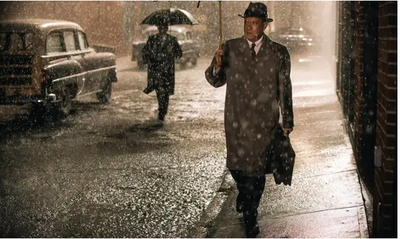by Benjamin Thernstrom
Many fictional stories about the Cold War pit good against evil—the writer’s own country is a beacon of righteousness and the enemy nation is filled with evildoers. And as Daniel Leab says in "The Cold War and the Movies", "The movies were among the fiercest participants in this war of ideas, in this combat of cultures." But "Bridge of Spies," made with the benefit of 25 years of hindsight, sets itself apart from propaganda pieces by exploring the humanity in both sides of the conflict.
"Bridge of Spies" tells the true story of James Donovan (Tom Hanks), an American insurance lawyer who is assigned in 1957 as the lawyer for Rudolf Abel (Mark Rylance), a spy for the Soviet Union. Donovan saved Abel from the death penalty, appealing the case all the way to the Supreme Court. In 1960, the Soviets would shoot down an American spy plane piloted by Gary Powers, and two years later, Donovan traveled to Berlin to negotiate a prisoner exchange of Powers for Abel, which would take place on the titular Glienicke Bridge.
"Bridge of Spies" is not a film that morally equates the two sides of the Cold War. The biggest contrast comes in how Abel and Powers are treated: the former has access to a fair trial that only results in imprisonment, while the latter is only granted a show trial before being tortured for information. Similarly, the violence of East German police is apparent when they shoot teenagers trying to escape to the West, and no such brutality is present in the scenes set in the United States.
However, "Bridge of Spies" never dehumanizes the enemies of the U.S., nor does it portray Americans consistently as valiant heroes. If the nations are not portrayed as equivalent, the people certainly are, for people are people no matter where they live. For the most part, it's a film that focuses on what is the same, rather than what is different.
"Bridge of Spies" never dehumanizes the enemies of the U.S., nor does it portray Americans consistently as valiant heroes.
Even if the American legal system clearly allows for more justice than the Soviet one, it's filled with people who are no less petty and selfish. Donovan consistently has to defend Abel's right to the best possible representation, refusing a request from the CIA for any information Abel has shared (which would be a violation of attorney-client privilege) and insisting on appeal for as long as the possibility of overturning Abel's conviction is open. During the negotiation of the prisoner exchange, he ignores the orders from his CIA handler and tries to negotiate the release of American student Frederic Pryor as well as Powers. The innocent Pryor, who was merely "at the wrong place at the wrong time" as he put it in a 2015 interview, lacks the political significance of Powers, and, as the film tells it, Donovan was the only reason his release was secured.

Donovan (Hanks) walking through the streets of Berlin. Image courtesy of DreamWorks
Donovan is certainly the film's hero. But even he is a flawed human being who can be prickly, defensive and even a bit of a show-off. During one passionate defense of Abel's Constitutional rights, Donovan (as Hanks portrays him) is as proud of rhetorically outflanking his adversary as he is righteous. A later scene, in which Donovan negotiates with an East German secretary, has him using folksy charm to lure the young man into conversation before he almost ruthlessly plays his trump card.
Those in the Soviet Union and East Germany are also humanized. Instead of portraying communist nations as a monolith, the film shows the East German desire to be recognized independently from the USSR. Abel, rather than an evil mastermind, is an ordinary man, with a hobby of painting and a growing friendship with Donovan.
Those in the Soviet Union and East Germany are also humanized. Instead of portraying communist nations as a monolith, the film shows the East German desire to be recognized independently from the USSR.
"Bridge of Spies" is a valuable film about the Cold War because it doesn't settle for the simplistic, unrealistic characterizations of "good guy" or "bad guy." That's not to say it sets up a moral equivalence — America is clearly portrayed as the less oppressive of the two superpowers. But nobody on either side is denied their essential humanity, both the good and the bad. Every era of history is going to have extreme national and political divisions, and our current one is no different, so that message in "Bridge of Spies" will always make it a valuable cinematic achievement.
Benjamin Thernstrom, a senior at Washington-Liberty High School in Arlington, Virginia, is an intern with PBS NewsHour Classroom. You can read more movie reviews by Thernstrom on LetterBoxd.



